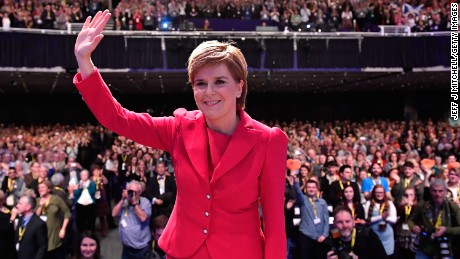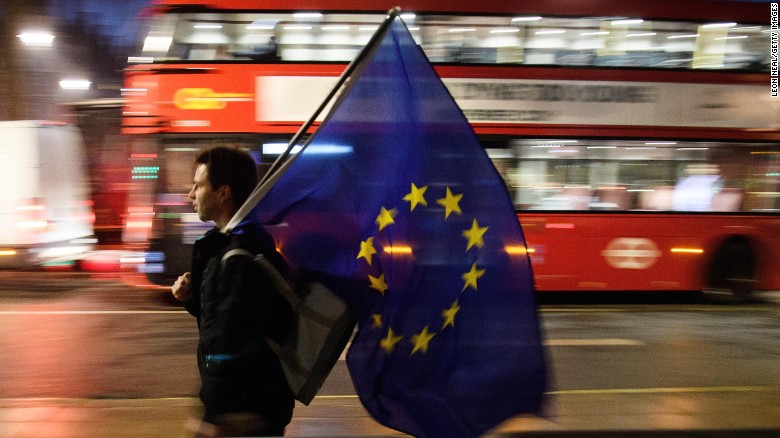British Parliament backs Brexit
The British Parliament has passed a bill that will allow Prime Minister Theresa May to start talks to leave the European Union.
The House of Commons rejected changes to the bill on Monday and then sent it back to the upper chamber for them to vote again.
The House of Lords voted not to insist on its original amendments giving protections to EU citizens in a post-Brexit Britain and calling for a "meaningful vote" on any divorce deal.
Instead the Lords passed the House of Commons' original proposals and the Queen will now sign the bill into law.
That clears the way for May to trigger Article 50, beginning the process by which Britain will give up its membership of the European Union.
Scotland to split away?
Earlier Monday, the First Minister of Scotland, Nicola Sturgeon, said she would lay the groundwork for a split from the United Kingdom as the British government prepared to press ahead with the formal process of leaving the European Union.
Sturgeon said it was clear the United Kingdom was heading for a "bad deal" on Brexit, and planned to seek the legal authority next week to hold a new independence referendum before Britain leaves the European Union.
May could begin the process of leaving the European Union as early as Tuesday. But Sturgeon's announcement on Monday and the looming Dutch elections on Wednesday could push the timetable back.
Speaking in Edinburgh, Sturgeon said she would ask the Scottish Parliament next week to grant her the power to call a new independence referendum.
Sturgeon said May had failed to engage with her call for Scotland to remain in the European single market after Brexit, and that Scotland risked being taken out of the European Union against its will.

Scotland calls for independence referendum
In the Brexit referendum, Scotland bucked the UK trend and voted 62% to 38% to remain in the European Union. Sturgeon said it was for Scots to decide whether they followed the rest of the United Kingdom or forged their own path.
"I am ensuring that Scotland's future ... will be decided by the people of Scotland," she told reporters at Bute House, the official residence of the Scottish first minister.
"It will be Scotland's choice and I trust the people of Scotland to make that choice."
Sturgeon said she wanted the referendum to take place between late 2018 and early 2019, before Brexit negotiations are completed. That would enable her to argue that Scotland should stay in the European Union as the rest of the United Kingdom left.
The UK government must agree to a new Scottish vote. Downing Street on Monday said Sturgeon's announcement was "divisive" and that May would seek a Brexit deal in the interests of the whole United Kingdom.
But the statement stopped short of saying the United Kingdom would block a new independence referendum. In the last one, in 2014, Scotland voted 55% to 45% to remain in the United Kingdom. Downing Street said there was no appetite in Scotland for a rerun.
It would be politically difficult for the UK government to deny Scotland permission for another referendum. But it may seek to argue about the timing, to avoid fighting a battle over independence in Scotland at the same time as negotiating an exit from the European Union.
John Curtice, professor of politics at the University of Strathclyde in Glasgow, said opinion polling on Scottish independence is close. "Nobody can be sure who would win," he said.
He said the "No" camp has generally held a slight lead over the past year and currently leads 52-48 if undecided voters are excluded, according to opinion polls tracked by the think tank ScotCen.
But polls suggest there are more than enough undecided voters to swing the results either way.
Pressure on May
May has come under increasing pressure from Parliament in recent weeks as the start of negotiations move closer.
On Sunday, lawmakers published a report which warned that the government's failure to prepare for a scenario in which no deal is reached with the European Union over Brexit would be a "serious dereliction of duty."
The House of Commons Foreign Affairs Committee said the United Kingdom should be prepared for the "real prospect" that the two-year negotiation cycle may end in deadlock.
"The possibility of 'no deal' is real enough to require the government to plan how to deal with it," head of the committee Crispin Blunt said in the report.
"But there is no evidence to indicate that this is receiving the consideration it deserves or that serious contingency planning is under way. The government has repeatedly said that it will walk away from a 'bad' final deal. That makes preparing for 'no deal' all the more essential," he added.
News Courtesy: www.cnn.com











